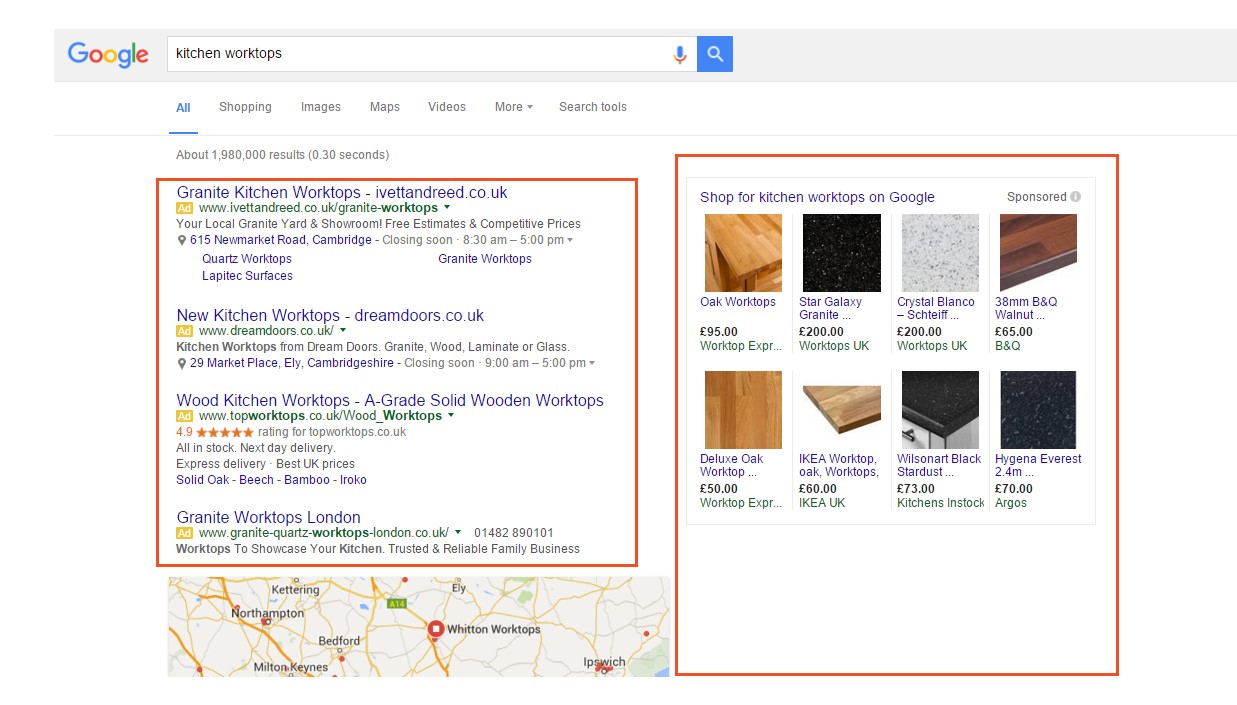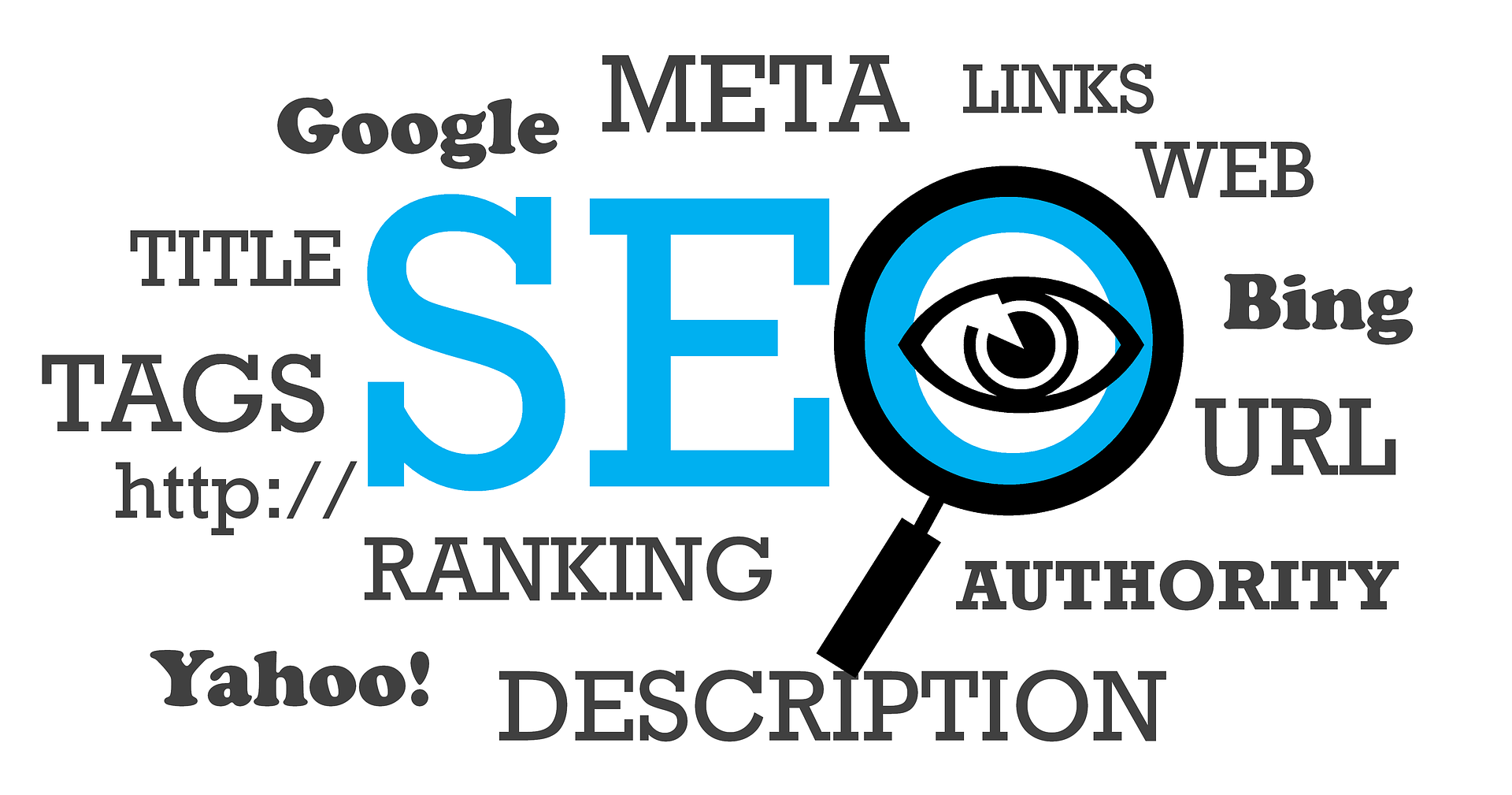Google is making big changes to AdWords, having confirmed that PPC ads in the sidebar on the right have been removed – instead opting for 4 paid ads at the top of the search engine results page (SERP), increased from the previous maximum of 3.
These new changes to the search results page are now live around the world, and has left the PPC community shocked, yet also intrigued as to how exactly this will impact businesses using PPC, and what Google has up its sleeve next.

What exactly has changed with AdWords?
Google has confirmed that AdWords paid search results will no longer be displayed on the right hand side.
Previously, Google displayed a maximum of 3 ads at the top of the search results, with the rest on the right. Now, Google will display 4 ads at the top, as the ones on the right are gone.
4 ads will be displayed for what Google refers to as “highly commercial queries” at the top of the search results, which is an increase from 3, and this new update only impacts the search results from desktop computers. There can also be a maximum of 3 adverts shown at the bottom of the results page, up from a previous maximum of 2.
Google’s official statement on the change is as follows:
We’ve been testing this layout for a long time, so some people might see it on a very small number of commercial queries. We’ll continue to make tweaks, but this is designed for highly commercial queries where the layout is able to provide more relevant results for people searching and better performance for advertisers.
The mobile search results remain unaffected – but this is obviously because mobile hasn’t had ads on the right of the results, due to the reduced screen real estate. 2 or 3 ads will still be displayed at the top of search results on mobile devices.
Exceptions to results on the right of the organic results include PLAs (Product Listing Ads), and ads in the knowledge graph displayed on the right.

Why is Google changing this?
The official reason behind this move is that there wasn’t enough traction for advertisers displayed on the right, which was not beneficial for the businesses in question, but also didn’t generate enough for Google too.
Ad blindness has long been a thing thanks to seasoned internet users who see advertising everywhere. Part of this is sidebar ad blindness, which has surely only increased as the daily usage of the internet has grown, with sidebar ads generating lower conversion rates, and generally lower trust with the public.
By displaying extra adverts at the top, it gives better prominence and performance for brands utilising PPC to drive traffic and generate conversions.
One side of this is that Google is going mobile-first, with a huge focus on the future of mobile devices. By making this change, it keeps the search results consistent across different devices and standardises the formula for search results. Alongside this, it simply adds a cleaner interface that is more appealing to its users.
Of course, by removing PPC ads from the right, it frees up room for Google to make better use of. What this could be is purely hypothetical at the moment, but it seems likely that Google would introduce more uses of knowledge graphs, product listing ads, or other revenue sources. No doubt that this move will simply just make Google more money – as investors need that all-important growth.
What does this mean for businesses and marketers?
As supply and demand suggests, this move will drive up the CPC (cost per click) – as there are now 6 or 7 ads overall, whereas previously 11 ads would have been displayed.
Now showing 4 ads means that organic results get pushed down further. Of course, 4 ads aren’t always shown, so the importance of ranking for organic results isn’t diminished.

But for highly competitive key phrases where 4 ads and other results may be pulled up, organic results could be pushed surprisingly far down. For instance, in the image above, it shows that no organic search results remain above the fold, due to the fact that four advertisements and the map results take up the majority of screen real estate.
With Google once again stressing its mobile-first approach, with consistency across results on various devices, it means that brands and marketers need to ensure the website users land on is mobile-friendly.
What should I do now?
Your AdWords account will need to be analysed and refined to ensure you will get the best spots, and also not be paying over-the-odds. There’s no need to throw money at PPC in order to get into the top four, and no need to drive cost up straightaway.
Small businesses need to act smarter on AdWords, and see what can be done to stretch your PPC budget as far as it can.
Despite the fact that the CPC will no doubt be higher, the value of the ads and their prominence in the search results may be more worthwhile to your company on certain search terms. So it’s worth refining which are the most valuable to you. Although, with ads being displayed more prominently, it should also mean they perform much better with a higher conversion rate.
It may also be worthwhile researching whether you can benefit from the Google Display Network if you’re already not utilising it – as an alternative to paying higher fees for competitive key terms.
We recommend that businesses undergo a position performance report to monitor changes after this new roll out, and then make bid changes accordingly. If you need a hand with this to ensure your AdWords account is in top shape, get in touch and we will be happy to help.
Let’s talk
For more information on the Google AdWords changes, or to learn how we can help you convert more visitors with PPC, get in touch with the team at Xanthos. Alternatively, learn more about our PPC services here.






